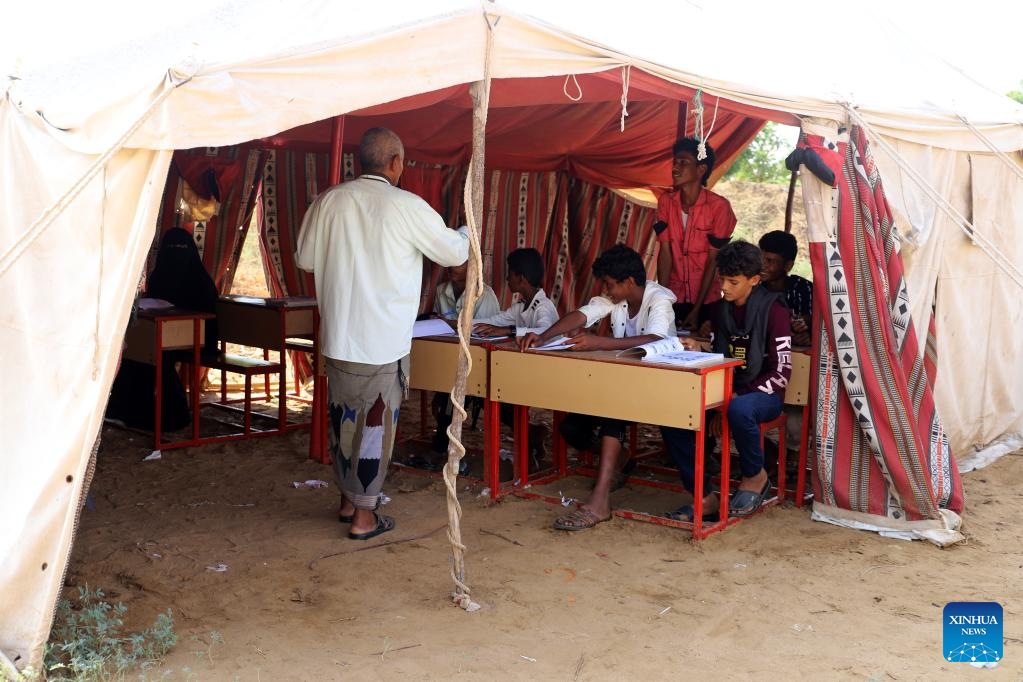
Students attend a class inside a makeshift classroom in Hajjah province, northwestern Yemen, on Oct. 23, 2022. Hundreds of students and teachers, with the help of the students' parents, have built 11 classrooms with tents, woods and straws in the village, which is 7 km away from their previous school that was destroyed during clashes between the government forces and Houthi rebels. (Photo by Mohammed Al-Wafi/Xinhua)
HAJJAH, Yemen, Oct. 25 (Xinhua) -- "You are the bright future of Yemen," Yahya Kadish, head of a newly rebuilt school in war-torn Yemen's northwestern province of Hajjah, kept cheering up the students while walking from one classroom to another to welcome them back to school.
The new school year in the school, located in the village of al-Rawozm under the government-controlled northern district of Abs, started about two months later than other schools as the work to rebuild the school just finished a few days ago.
Hundreds of students and teachers, with the help of the students' parents, have built 11 classrooms with tents, woods and straws in the village, which is 7 km away from their previous school that was destroyed during clashes between the government forces and Houthi rebels.
"We have overcome many challenges with the help of the teachers, the students, and their families, despite the difficulties and the lack of financial support, in addition to the suffering of the continuous interruption of salaries and the deteriorating economic conditions that affected everyone," Kadish told Xinhua.
These new classrooms "serve as a lifeline for the continuation of the educational process," he said.
Though without sufficient funds, equipment and power supply, "we will continue rebuilding our school and teaching our children, and we will continue breathing freedom and we will surely win," the school head vowed.
"The violent clashes have recently expanded, and we found the children's former school became at the middle of the front line, which forced us to resort to constructing these tents and huts," Khalid Jabiry, a teacher, told Xinhua.
"We helped our teachers in building these classrooms, which took us about five weeks of work, and we risked our lives to bring all the necessary materials from far away despite the dangers of mines scattered in the fields and farm," Hasan Mohammed Mubarak, a 13-year-old student, told Xinhua.
The students and teachers are determined to catch up despite the delayed start of the new school year.
"We want to continue learning at school, so we all cooperated in establishing the appropriate alternative according to the possibilities available in order to catch up with the school year and keep pace with other schools," Mubarak said.
Yemen has been mired in a civil war since late 2014 when the Houthi militia stormed several northern cities and forced the Yemeni government out of the capital Sanaa. The war has killed tens of thousands of people, displaced 4 million others, and pushed the country to the brink of famine.
The United Nations Children's Fund (UNICEF) has estimated that about 2,916 (at least one in four) schools in Yemen have been destroyed, partially damaged, or utilized for non-educational purposes since the start of the civil war.
It is also estimated that 2 million Yemeni children have dropped out of school and nearly 172,000 teachers have not been paid on a regular basis since 2016, many of whom have been forced to leave their posts to find alternative sources of income.
Jabiry said that, despite all the difficulties and challenges, the school will try its best to keep operating, so as to give the students "a bright future."
"And yes, here it is safe, but problems and obstacles from the deteriorating economic situations are accumulating, and they may lead to a number of children dropping out of these classes and being exploited in hard work... but we will try that not happen," the teacher said.
But schools in or near the conflict zones are always at risk as long as the civil war continues.
Imene Trabelsi, the spokesperson of the International Committee of the Red Cross (ICRC) for the Near and Middle East, warned of a possible escalation of the conflict in Yemen.
"With the announcement of the end of the truce, there are fears of a return to the escalation of violence, and therefore there could be large numbers of children who are unable to go to school, in addition to the dangers surrounding them," Trabelsi told Xinhua in an exclusive interview.
He was referring to the UN-brokered six-month-long national truce in Yemen that ended on Oct. 2. The Yemeni warring sides failed earlier this month to reach an agreement to extend the truce.
"The announcement of the end of the truce is one of the indicators that raise our fears and concerns," the ICRC spokesperson added. ■
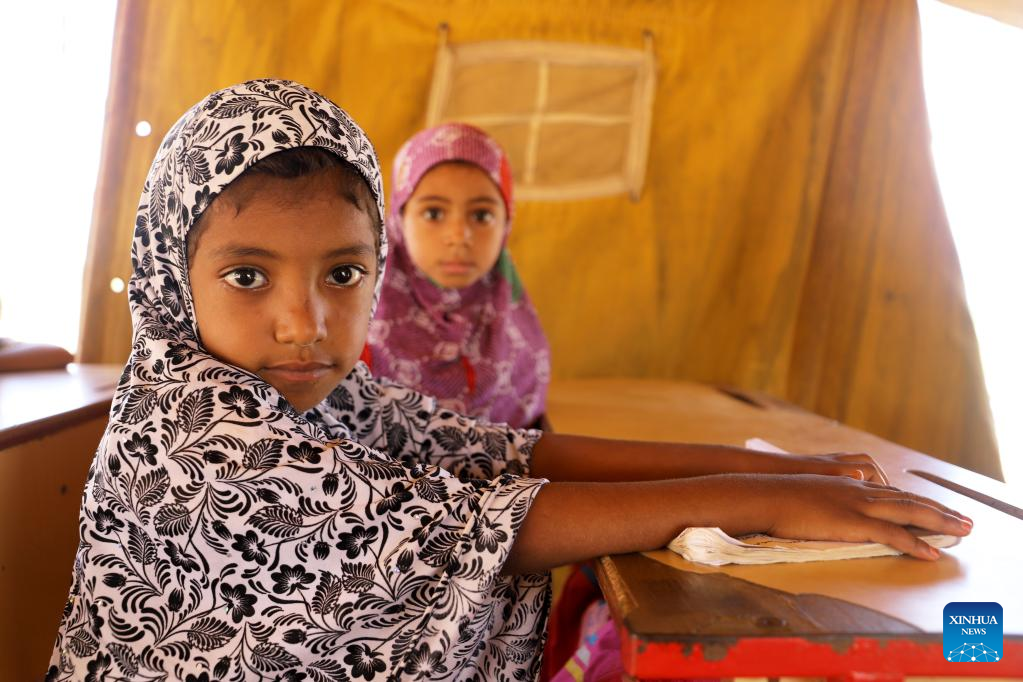
Students are seen inside a makeshift classroom in Hajjah province, northwestern Yemen, on Oct. 23, 2022. Hundreds of students and teachers, with the help of the students' parents, have built 11 classrooms with tents, woods and straws in the village, which is 7 km away from their previous school that was destroyed during clashes between the government forces and Houthi rebels. (Photo by Mohammed Al-Wafi/Xinhua)
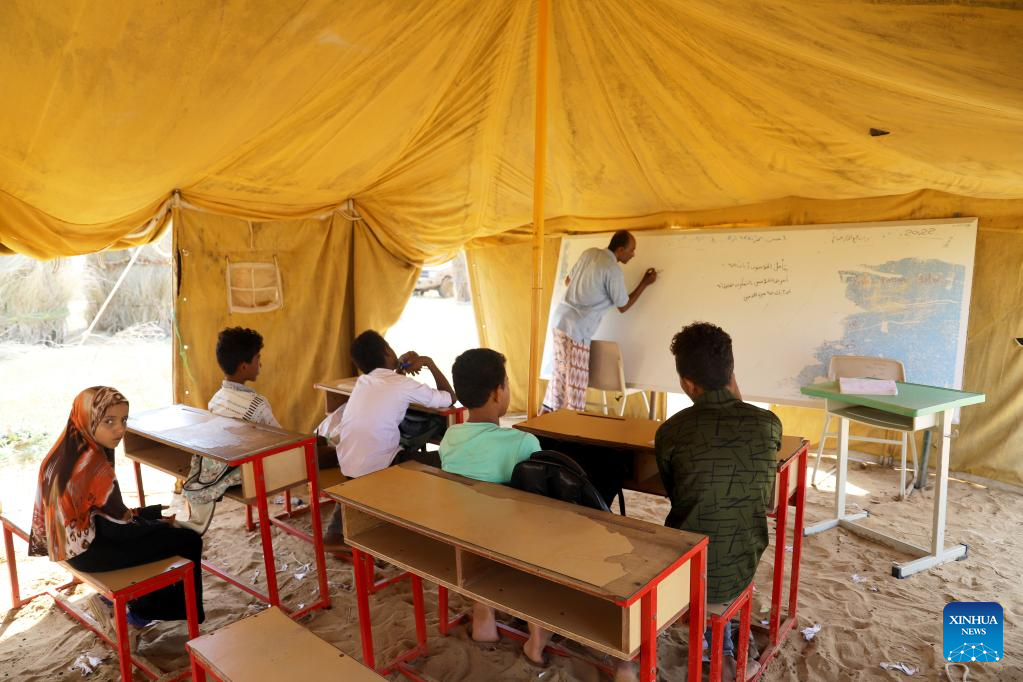
Students attend a class inside a makeshift classroom in Hajjah province, northwestern Yemen, on Oct. 23, 2022. Hundreds of students and teachers, with the help of the students' parents, have built 11 classrooms with tents, woods and straws in the village, which is 7 km away from their previous school that was destroyed during clashes between the government forces and Houthi rebels. (Photo by Mohammed Al-Wafi/Xinhua)
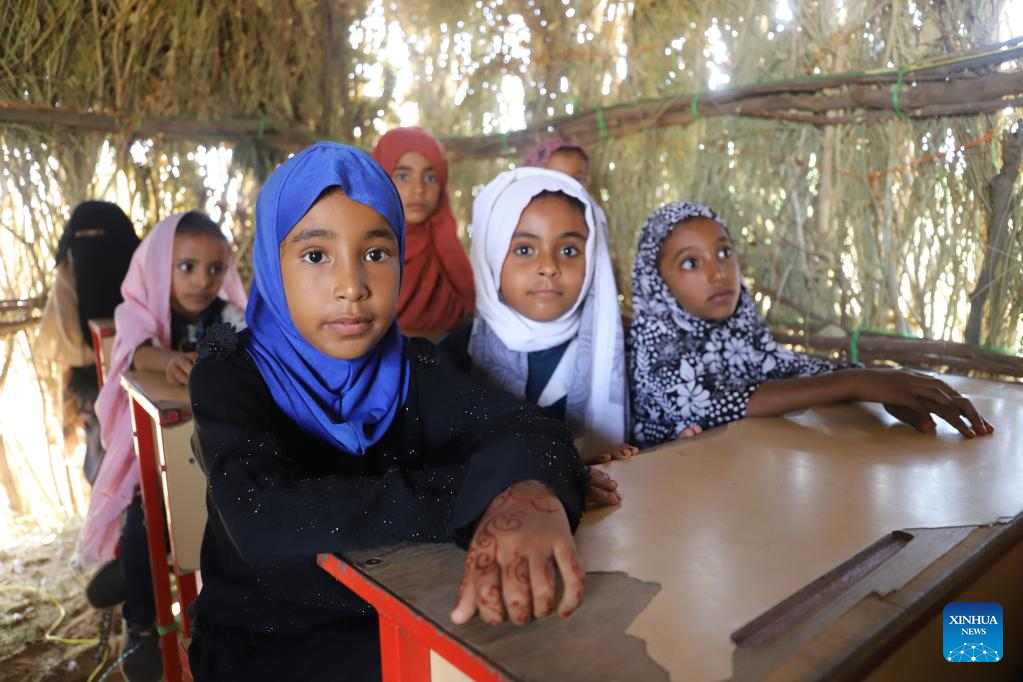
Students are seen inside a makeshift classroom in Hajjah province, northwestern Yemen, on Oct. 23, 2022. Hundreds of students and teachers, with the help of the students' parents, have built 11 classrooms with tents, woods and straws in the village, which is 7 km away from their previous school that was destroyed during clashes between the government forces and Houthi rebels. (Photo by Mohammed Al-Wafi/Xinhua)
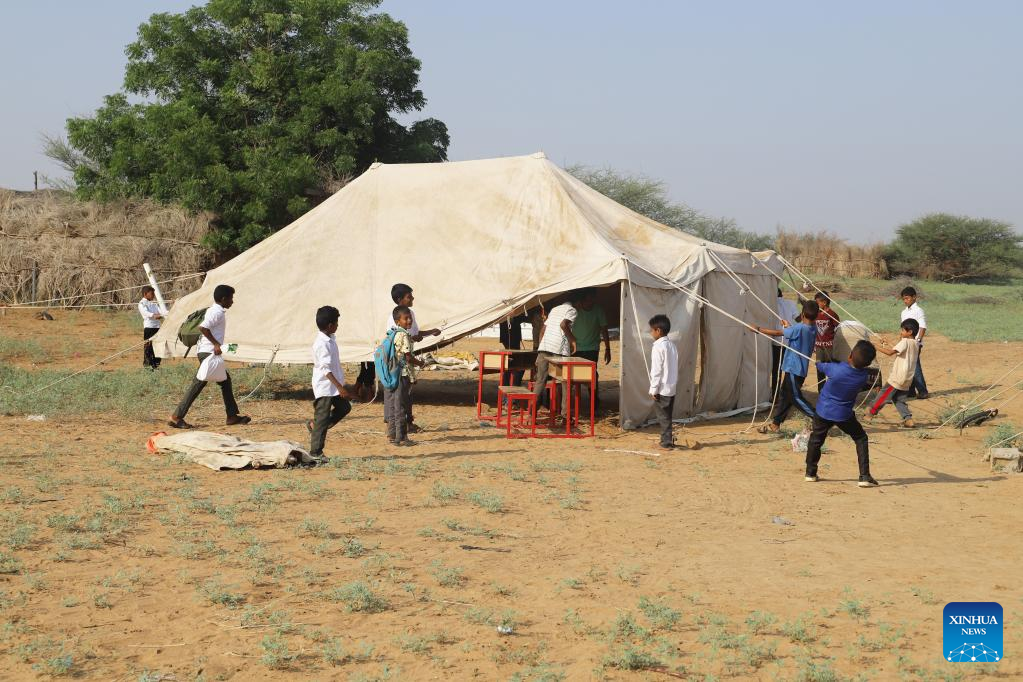
Students help to set up a makeshift classroom in Hajjah province, northwestern Yemen, on Oct. 23, 2022. Hundreds of students and teachers, with the help of the students' parents, have built 11 classrooms with tents, woods and straws in the village, which is 7 km away from their previous school that was destroyed during clashes between the government forces and Houthi rebels. (Photo by Mohammed Al-Wafi/Xinhua)
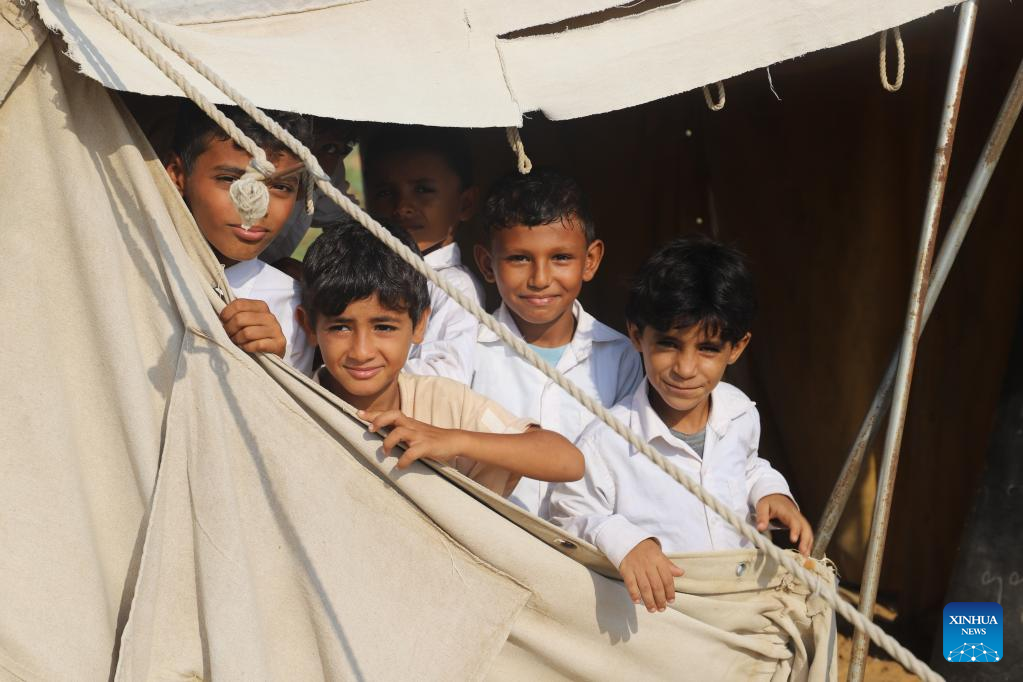
Students stand in a makeshift classroom in Hajjah province, northwestern Yemen, on Oct. 23, 2022. Hundreds of students and teachers, with the help of the students' parents, have built 11 classrooms with tents, woods and straws in the village, which is 7 km away from their previous school that was destroyed during clashes between the government forces and Houthi rebels. (Photo by Mohammed Al-Wafi/Xinhua)
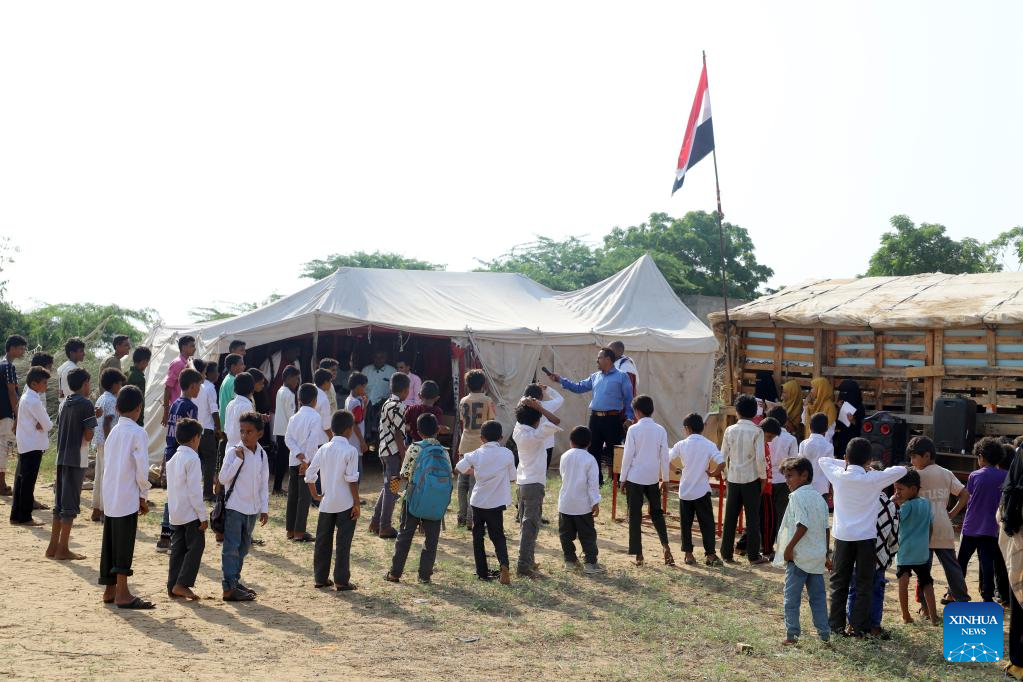
Students gather outside makeshift classrooms in Hajjah province, northwestern Yemen, on Oct. 23, 2022. Hundreds of students and teachers, with the help of the students' parents, have built 11 classrooms with tents, woods and straws in the village, which is 7 km away from their previous school that was destroyed during clashes between the government forces and Houthi rebels. (Photo by Mohammed Al-Wafi/Xinhua)



